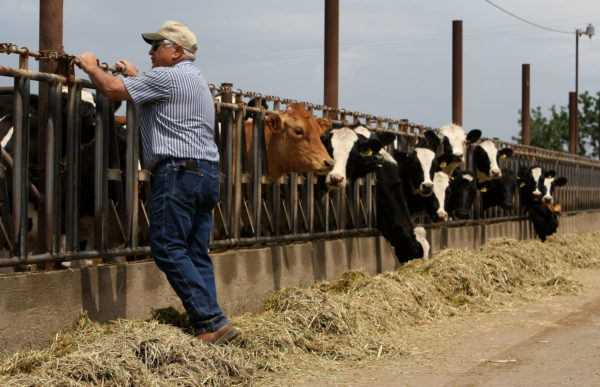Unearthed today: The hard stuff isn’t about tech

I’m reading about… intensive farming and climate change.
Climate news can feel very binary sometimes. Look at the power supply and, perhaps, personal transport, and you can feel pretty uplifted. Essentially the tech is there, and the policy solutions are not all that complicated. Build turbines, solar panels and electric cars. Building and selling new tech is very much core to our current MO. It’s all gonna be just fine.
Take today’s news. The UK is gearing up to spend more than $2bn on small modular reactors, or mini-nukes, a tech that barely even exists yet whilst a firm most of us have never heard of but which is the world’s biggest provider of wind and solar energy is now more valuable than Exxon.
But you can’t get to 1.5 or even 2 degrees just by building loads of shiny new tech. Not even close. Leaving aside the issue of retiring the old stuff – which is also not going so well – that’s where farming, housing, industry and even overall levels of consumption come in. And there it is… complicated.
Today The Guardian and Reuters report on a major new study about Nitrous Oxide, N20, laughing gas… whatever you call it, it’s also a very potent greenhouse gas levels of which are now 20% higher than in pre-industrial times.
But it’s not coming from industry but from intensive agriculture. From the nitrous fertiliser put on soil to make it more productive whilst sustaining monocultures; from animal manure and from deforestation – normally fuelled by agriculture – which increases the amount of N20 produced by soil bacteria.
Hanqin Tian, a professor at Auburn University in the US and lead author of the study, said: “The dominant driver of the increase comes from agriculture and the growing demand for food and feed for animals will further increase global nitrous oxide emissions. There is a conflict between the way we are feeding people, and stabilising the climate.”
Nitrogen run-off from farming also harms rivers and lakes, and ammonia – from fertilisers and manure – is a leading cause of air pollution.
The issue can be fixed. But not with clever tech.
Farmers can reduce the amount of nitrous oxide produced by simple measures such as targeting their fertiliser use more carefully, avoiding excess and using fertiliser only in the right weather conditions.
“We have the tools to reduce this problem,” said Parvadha Suntharalingam of the University of East Anglia, the co-author of the paper. “This is not insurmountable. But these practices need to be adopted more widely. We don’t have to sacrifice production, just make sure it is managed more carefully.”
Five things you need to know today
September was the world’s ‘hottest on record’: It is the nature of climate change that we’ll keep getting these headlines such that soon they will probably mostly classify as weather news.
EU’s tussle over climate change ambition heats up after Parliament vote: The European Parliament has voted in favour of a legally binding target for the European Union to cut its greenhouse gas emissions by 60% by 2030, against 1990 levels, according to vote results released on Wednesday. The vote puts the parliament in conflict with the commission (55%) which is – itself – struggling to muster support from member states for even that goal.
Storm-weary U.S. energy producers, refiners prep for hurricane strike: Oil and gas workers withdrew en masse from offshore production facilities, and onshore refineries began storm preparations on Wednesday as Hurricane Delta was forecast to intensify into a powerful, Category 3 storm as it crosses the Gulf of Mexico.
SO2 emissions fall in India as coal use slows: India’s toxic sulfur dioxide (SO2) emissions fell in 2019 for the first time in four years as coal use decreased, reveals a new analysis of NASA satellite data by Greenpeace India and the Centre for Research on Energy and Clean Air (CREA)

